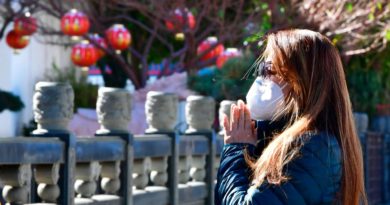U.S. deaths pass 90,000; reopening process underway in all 50 states
DUBAI — Qatar announced new restrictions on residents, including the mandatory download of a tracking app and the closure of all nonessential stores for the next 10 days, as new infections soar across the region during Ramadan.
Several other Persian Gulf states, including Saudi Arabia, the United Arab Emirates and Kuwait, have imposed new restrictions recently as cases have increased dramatically following the easing of constraints during the holy month.
Qatar’s announcement followed a cabinet meeting Monday. Starting May 22, all citizens and residents leaving their homes must download the Ehteraz tracking app on their phones so that those coming into contact with someone who tests positive can be tracked. Face masks are also mandatory in Qatar, and violators face jail time and fines of up to $53,000.
Qatar has reported 34,000 cases of the virus (more than 1 percent of the population), with 1,365 new ones just on Monday.
The UAE also announced late Monday that the night curfew would begin at 8 p.m. instead of 10 p.m., “in light of what we have observed during the holy month of Ramadan and the increase in the number of covid-19 infections resulting from some of the individuals in the community who were reckless and didn’t take into account the precautionary measures,” said Saif Juma al-Dhaheri of the Safety and Prevention Department.
Cases in the UAE have topped 24,000, more than twice the number before Ramadan began late last month. Dhaheri warned against family gatherings that could further spread the virus. The fasting period will end this weekend with the Eid al-Fitr holiday, which is normally celebrated with days of family visits and communal dinners.
Saudi Arabia and Kuwait have also experienced major jumps in the new numbers of cases over the weeks of Ramadan, and both have reimposed restrictions.
Starting on Eid al-Fitr, Saudi Arabia, the worst-hit country in the region after Iran, will return to a 24-hour lockdown. The kingdom reported 2,593 new cases Monday, for a total of more than 57,000.
In contrast, prayers at the al-Aqsa Mosque compound in Jerusalem will resume following the end of Ramadan festivities, as the virus’s spread there has slowed, the Council of the Islamic Waqf, the religious body that controls the site, said Tuesday.
The Waqf, in coordination with Israeli, Palestinian and Jordanian officials, closed the compound nearly two months ago. In the announcement Tuesday, the Waqf said that worshipers would be allowed back into the outdoor prayer area, although it was not clear whether they would be allowed into the al-Aqsa Mosque and Dome of the Rock on the site as well, Reuters reported.



